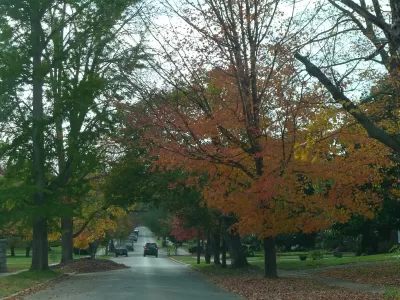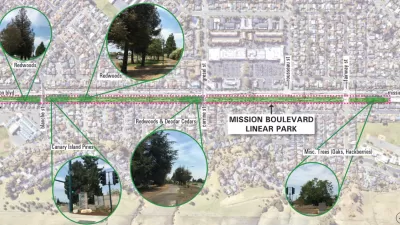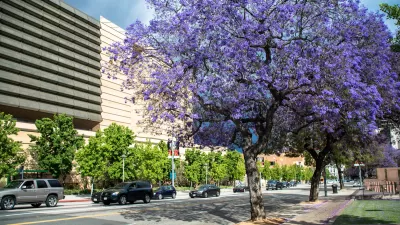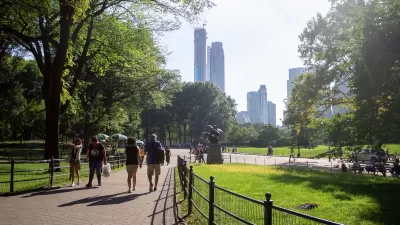A new study shows that regular exposure to trees and green spaces has a powerful impact on depression and mental health.

In a piece for The Guardian, Ashley Stimpson reports on new research that shows the importance of tree cover in urban neighborhoods and draws attention to the "tree inequity" that plagues many low-income communities.
"In many cities, a map of urban tree cover reflects the geography of race and income," Stimpson writes. Historic redlining, blamed for housing inequities and disinvestment, also has a significant impact on a neighborhood's trees—or lack thereof. "According to the US Forest Service, previously redlined areas have an average of 23% tree cover, while once-greenlined neighborhoods, living up to their old label, have an average of 43% tree cover."
Trees aren't just about aesthetics: studies show that they mitigate the urban heat island effect and boost residents' physical and mental health. "Summer days in East Baltimore neighborhoods," which are predominantly Black, historically redlined, and lack extensive tree cover, "can be four to 16 degrees hotter than other parts of the city." In such neighborhoods, residents face the risk of heat-related illnesses, higher cooling costs, and poorer air quality.
Now, research is zeroing in on the mental health effects of city trees. Using "the correlation between prescription antidepressants and tree cover across a range of neighborhoods," a group of researchers in Germany "were able to demonstrate in more material terms than ever before the correlation between trees and mental wellness." Their findings show that having trees within 100 meters of one's home is associated with reduced antidepressant use, a relationship "especially pronounced in residents with low socioeconomic status." The study's authors suggests that "'unintentional' everyday contact" with nature and "easily accessible urban green space" can have a noticeable positive impact on public health.
FULL STORY: Green health: a tree-filled street can positively influence depression, study finds

Alabama: Trump Terminates Settlements for Black Communities Harmed By Raw Sewage
Trump deemed the landmark civil rights agreement “illegal DEI and environmental justice policy.”

Planetizen Federal Action Tracker
A weekly monitor of how Trump’s orders and actions are impacting planners and planning in America.

How Atlanta Built 7,000 Housing Units in 3 Years
The city’s comprehensive, neighborhood-focused housing strategy focuses on identifying properties and land that can be repurposed for housing and encouraging development in underserved neighborhoods.

In Both Crashes and Crime, Public Transportation is Far Safer than Driving
Contrary to popular assumptions, public transportation has far lower crash and crime rates than automobile travel. For safer communities, improve and encourage transit travel.

Report: Zoning Reforms Should Complement Nashville’s Ambitious Transit Plan
Without reform, restrictive zoning codes will limit the impact of the city’s planned transit expansion and could exclude some of the residents who depend on transit the most.

Judge Orders Release of Frozen IRA, IIJA Funding
The decision is a victory for environmental groups who charged that freezing funds for critical infrastructure and disaster response programs caused “real and irreparable harm” to communities.
Urban Design for Planners 1: Software Tools
This six-course series explores essential urban design concepts using open source software and equips planners with the tools they need to participate fully in the urban design process.
Planning for Universal Design
Learn the tools for implementing Universal Design in planning regulations.
Jessamine County Fiscal Court
Caltrans
Institute for Housing and Urban Development Studies (IHS)
City of Grandview
Harvard GSD Executive Education
Toledo-Lucas County Plan Commissions
Salt Lake City
NYU Wagner Graduate School of Public Service





























